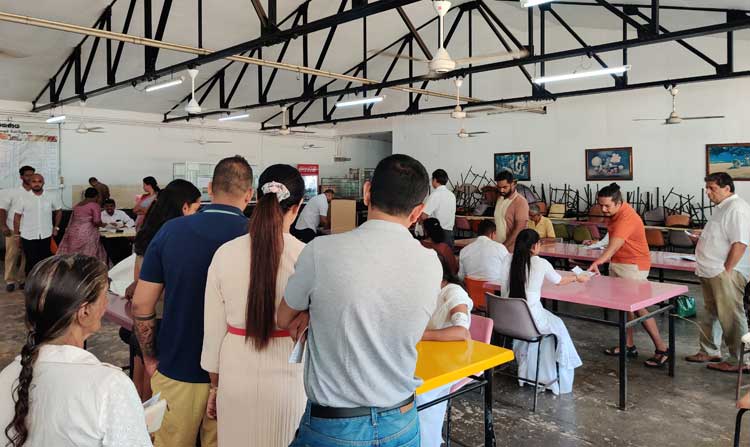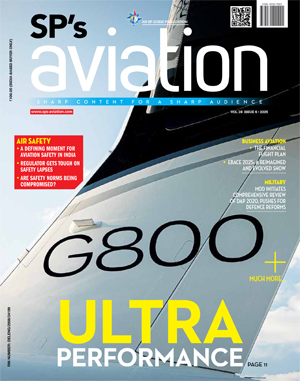INDIAN ARMED FORCES CHIEFS ON OUR RELENTLESS AND FOCUSED PUBLISHING EFFORTS

The insightful articles, inspiring narrations and analytical perspectives presented by the Editorial Team, establish an alluring connect with the reader. My compliments and best wishes to SP Guide Publications.

"Over the past 60 years, the growth of SP Guide Publications has mirrored the rising stature of Indian Navy. Its well-researched and informative magazines on Defence and Aerospace sector have served to shape an educated opinion of our military personnel, policy makers and the public alike. I wish SP's Publication team continued success, fair winds and following seas in all future endeavour!"

Since, its inception in 1964, SP Guide Publications has consistently demonstrated commitment to high-quality journalism in the aerospace and defence sectors, earning a well-deserved reputation as Asia's largest media house in this domain. I wish SP Guide Publications continued success in its pursuit of excellence.
- Prime Minister Modi Visits Punjab’s Adampur Air Base, Interacts with Airmen after Successful ‘Operation Sindoor’; Stern Message to Pakistan
- The layered Air Defence systems that worked superbly, the key element of Operation Sindoor
- Operation Sindoor | Day 2 DGMOs Briefing
- Operation Sindoor: Resolute yet Restrained
- India's Operation Sindoor Sends a Clear Message to Terror and the World – ‘ZERO TOLERANCE’
- Japan and India set forth a defence cooperation consultancy framework, talks on tank and jet engines
Where is Sri Lanka heading — Economic Stability or A New Wave of Change
This election will define the roadmap for Sri Lanka's future out of the beleaguered economic crisis, embroiled in hefty loans from the IMF and other global institutions amid painful economic restructuring, writes Manish Kumar Jha in an exclusive report from Colombo.


KW Tusahar, age 43, a post-doctoral student in a Government Institute's Research Department gleans when asked what is on his mind when he casts his vote? "Young people need to vote. We need economic relief. We suffered during the economic crisis. I support Arun Dissanayake".
Why?
"I want a change, a new generation, he has Good economic knowledge, they have a good economic team."
A distance away, walking down towards a polling station near Royal College, a prominent school in Colombo for the young, brightest students and affluents, when I asked a girl, "Who do you think can bring solutions to Sri Lanka's problems?", she shot back "Ranil Wickremesinghe". "They [other candidates] all have the potential but Ranil Wickremesinghe is better than them. It is about the economy and jobs. He will bring further stability to our economy and he has done a good job for the past two years. We know he is good."
Sri Lanka's struggle continues from its worst financial crisis, with the ballot serving as a referendum on austerity measures imposed by the International Monetary Fund (IMF) last year
She further adds: "However, we need a change in Just everything in general: the economy, the society, just everything."
This is the contest which will define the roadmap for Sri Lanka's future out of the beleaguered economic crisis, embroiled in hefty loans from the IMF and other global institutions amid painful economic restructuring, and greater tax and job cuts. On top, the tussle for geopolitical stability remains on this strategic island in the heart of the Indian Ocean Region (IOR). Sri Lanka's struggle continues from its worst financial crisis, the ballot is a referendum on austerity measures imposed by the International Monetary Fund (IMF) last year.
As a caution, the IMF warns that while the Sri Lankan economy has made notable progress after the crisis based on tough measures, the country is still vulnerable and must work to protect the hard-earned gains. What is then at stake in this election?
Election, Loan, and debt
Under the leadership of President Wickremesinghe, the country managed a $5.8bn debt restructuring with several countries including India and Japan in June while renegotiating a complex $4.2bn debt restructuring plan with China's Ex-Im Bank last year.
In fact, at the nick of time, two days before the election on Thursday, the Government secured a deal with a bunch of private investors, leading to the restructuring of $12.5bn of international bonds. Crucially, the incumbent President showed urgency with promises that he is capable of such hard measures and clinching vital deals internationally. By doing so, Sri Lanka secures its fourth tranche of critical IMF bailout funds.
Sri Lanka does witness such a turnaround as the rupee has stabilised and inflation has come down sharply from its 2022 peak. Further, the economy is slated to expand by 2.2 per cent in 2024 as per the latest report from the World Bank. Under the IMF's Extended Fund Facility (EFF) programme, its Executive Board concluded the 2024 Article IV Consultation and the Second Review of the EFF, unlocking around $336 million in funding. The Government has rallied behind the domestic debt restructuring efforts, some of them by private entities, broadening the scope of greater economic recovery.
Ranil Wickremesinghe has been credited with achieving a significant degree of economic stability, backed by indicators from the IMF-led reforms, including a reduced rate of inflation and increased foreign reserves
On the restructuring of commercial debts (ISB), Chairman of Advocate Institute Murtaza Jafferjee explained to the media in Colombo that it was a game changer on the path to debt sustainability. He said Sri Lanka is now under selective credit rating, and it will probably take a few more months probably to complete the whole process.
This would enable a ratings cycle to begin. "Getting an investable rating is fundamental to our economic rating. It is important to ensure that our debt-carrying capacity is improved before 2028 so that we gain access to the international market," he remarks.
However, the woes continue on the ground level with severe austere measures built upon heavy taxes. The impact of the crisis is visible as the poverty rate has multiplied.
Who can bring change?
A hotbed of geopolitical activities in the Indian sub-continent, Sri Lanka is at a crossroads with the election bringing promises of the continuity of economic stability on the one hand by the incumbent President Ranil Wickremesinghe and a new wave of radical thoughts with the eradication of corruption and inclusive economy for the citizens by the other two key candidates—Aruna Kumara Dissanayake and Sajith Premadasa.
Ranil Wickremesinghe, 75, a lawyer who has served as Prime Minister a record six times, Wickremesinghe's party needs to drum up support from key parties to bolster his chances.
As the leader of the United National Party (UNP), he took office in July 2022 after widespread protests unleashed by the debilitating financial crisis forced his predecessor Gotabaya Rajapaksa to flee Sri Lanka and later resign. Parliament elected Wickremesinghe to serve out the rest of the five-year term of Rajapaksa, who took office in 2019.
Anura Kumara Dissanayake, leader of National People's Power (NPP), has gained popularity with his anti-corruption message and promise of systemic change, resonating with voters calling for a new political culture
Under his leadership, the government secured approximately $2.9 billion ($S3.79 billion) bailout from the International Monetary Fund (IMF). He gets credit for achieving a great degree of economic stability which is backed by the indicators of this government's economic stabilisation drive and the IMF-led reforms programme with a reduced rate of inflation and increased foreign reserves to approximately $5.4 billion (S$7 billion) by May 2024.
The President's campaign manifesto, Puluwan Sri Lanka ('Sri Lanka Can'), includes the vision of a Theravada Trade Economy which claims to be an economic system based on the concept of Theravada Buddhist (which is likely to appeal to the Sinhala Buddhist majority vote) but essentially advocates for highly competitive and export-oriented trade over economic policies that are primarily focused on domestic production.
On the other side is Anura Kumara Dissanayake, 55, the leader of National People's Power (NPP), who has seen a sharp rise in popularity since 2022, having secured only around three per cent of the vote in the last presidential election. Its anti-corruption message and promise of a change in political culture resonate strongly with voters who are demanding 'system change' – a key slogan during the Aragalaya.
While initially, the NPP opposed IMF programmes, he has had a change of policy, endorsing the current programme (although with a renegotiation of its terms) as seen in its manifesto, 'A Rich Country, A Beautiful Life', marks a significant shift.
Sajith Premadasa, the opposition leader, advocates for economic liberalism and is campaigning on promises of state-linked patronage and pro-poor policies, positioning himself left of the current government
Despite holding just three seats in parliament, Dissanayake's promise of tough anti-corruption measures and pro-poor policies have given a popular boost to his candidacy.
He is contesting under the NPP coalition, which includes his Marxist-leaning party People's Liberation Front. His party has traditionally backed stronger state intervention and more closed-market economic policies.
In the fray is another prominent leader with a great legacy of the past, Sajith Premadasa, 57 is the Opposition leader and son of former President Ranasinghe Premadasa. He leads the Samagi Jana Balawegaya (SJB) that broke with Wickremesinghe's UNP in 2020.
Being a breakaway of the UNP, the SJB advocates largely for economic liberalism. However, the SJB under Premadasa attempts to position itself to be slightly left of the current government's economic policy. Premadasa's manifesto ('A Win for All') characterises its economic policy as "social democratic". Premadasa has worked to cultivate a pro-poor image, leveraging his father's (former President Ranasinghe Premadasa) legacy to appeal to the economically marginalised and with campaign promises of state-linked patronage and subsidies.
His centrist, more left-leaning party has called for changes to the $2.9 billion bailout programme with the International Monetary Fund and outlined plans to adjust some targets, such as changing taxes to reduce the cost of living. Premadasa does favour a mix of interventionist and free-market economic policies.
Amid all the fervour, the most important criterion is to ensure that the country's economy is growing, says a local businessman, Fazimi Bawa, who lost his small-scale shoe business due to the cheap Chinese products flooding the markets and driving local players away as they could not cope up with mass-machine production and well-oiled supply chain of the Chinese companies, which is further supported by the Chinese government in various shapes and subsidies.
For him, the election is about getting his business back, paying salary to his 300 staff as he calls: "Running the economy for us and not for them."
"It is about our simple life", he rues. We simply want that back!
Manish Kumar Jha is a Consulting & Contributing Editor for SP's Aviation, SP's Land Forces and SP's Naval Forces and a security expert. He writes on national security, military technology, strategic affairs & policies.





